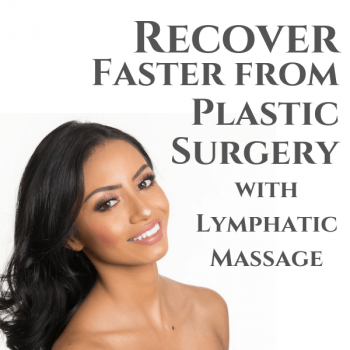Dirty Little Secrets
About the
Plastic Surgery Recovery Industry

What You Don’t Know
CAN Hurt You
Dirty Little Secret #1
Did you know that many people who work in the plastic surgery recovery industry are not licensed and have little (if any) training in anatomy and physiology? Know how to assess your therapist.
Dirty Little Secret #2
Did you know that most of the videos on YouTube and Instagram portraying lymphatic drainage massage as painful are actually not showing lymphatic massage at all?
Did you know that it is illegal in most states for a licensed massage therapist to work directly on a wound? That means that anyone who is reopening incisions or just simply draining fluid from incisions (incisional drainage) is breaking the law? Not only is it illegal, but it is painful, unnecessary, and could possibly cause an infection serious enough to kill you. Find out what real lymphatic massage is.
Dirty Little Secret #3
Did you know that many people who do this work are not insured? So what happens to you if a person who is not trained hurts you with their work? (As in that person ends up giving you an infection that at best may require IV antibiotics and at worst could kill you.) Ask what insurance your therapist carries.
Dirty Little Secret #4
There are a number of unethical people who prey on the fact that many people coming out of plastic surgery don’t really understand what they need to get better. Be wary of practitioners who will tell you that you will need a lot of extra expensive services without ever having laid eyes or hands on you to figure out what your unique healing journey will be like.
Dirty Little Secret #5
Did you know that some plastic surgeons give out scripts for Deep Tissue Massage and Cavitation Therapy right after surgery, despite the fact that both of these techniques are completely inappropriate for someone who is in the first few weeks of surgical recovery? Find a therapist who is has advanced lymphatic training and who has training in compression therapy.
Keep reading for more information on these Dirty Little Secrets.
There is a Lot More you will want to know.
Confused?
If you are about to have plastic surgery or you have just had plastic surgery and you are confused by all of the misinformation out there, you are not alone.

Many well-trained lymphatic therapists have begun speaking out recently about these problems. We are tired of hearing stories of people who spend their hard-earned dollars thinking that they are doing the right thing by getting what they think is lymphatic massage after their surgery. (It usually ISN’T lymphatic at all. It’s unskilled torturous, injurious nonsense that has no basis in science, anatomy, and physiology – unlike ACTUAL lymphatic work that is scientifically proven to move lymphatic fluid.)
Many of them end up paying for services from unlicensed, untrained, uninsured, and / or uneducated individuals who are using ineffective and sometimes dangerous techniques that can cause harm.
The worst part about that is that because so many of these “practitioners” are great with social media, there has been a culture created that propagates the myth that you must suffer through massages after your surgery. So, when they go for these painful therapies, they think they have found the right therapist. Meanwhile, those of us who have had proper training spend hours trying to convince people not only that it doesn’t have to be that way, but that it shouldn’t be that way.
But, don’t take my word for it.
Here’s an article from December 11, 2020 regarding just such a practitioner who is being sanctioned for performing incisional drainage (incorrectly referred to in the article as “lymphatic drainage massages”).
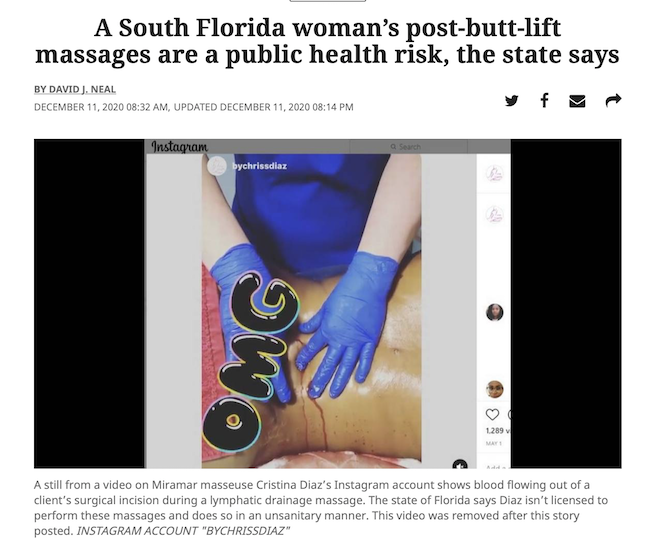
The Miami Herald reports: “Ms. Diaz [the therapist in question] willfully abused her position as a massage therapist to advertise and engage in dangerous practices outside of the scope of her license,” the emergency restriction order states. “She subjected herself, her patients, the public and an undetermined number of associates to needless risk of infection…Ms. Diaz’s actions demonstrate that she poses a significant danger to patients as long as she continues to improperly perform post-surgical drainage massages.”
She Isn’t The Only One Who Got Into Major Trouble
The ever-popular “Squeeze Lady” in Florida has had her license restricted from working on post-operative clients in an emergency order issued by the Surgeon General (as of July 7, 2021). You can read the Massage Board Ruling against her in the link in this paragraph.l
In short, it states:
“Ms. Corao violated section 480.046(1)(i) by failing to practice massage therapy with the acceptable level of care, skill, and treatment in one or more of the following ways:
a. Performing lymphatic drainage massages by pressing around incision sites to drain or forcefully expel blood and/or other bodily fluids from patients’ post-surgical wounds;
b. Using techniques that create a dangerous risk of infection to the therapist, patient, and others;
c. Puncturing a patient’s skin in order to expel fluid from a patient;
d. Performing medical services in an unauthorized environment; and/or
e. Failing to appropriately drape clients.
Ms. Corao violated section 480.046(1)(j) by performing and offering to perform “lymphatic drainage massages” which consisted of exuding fluids from open surgical wounds and puncturing a patient’s skin, which are outside of the scope of practice of a massage therapist as permitted by law”
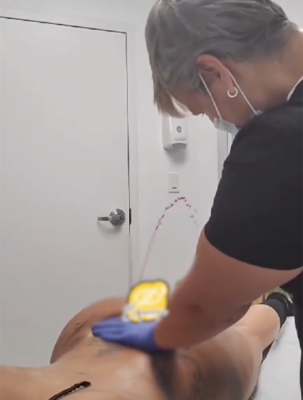
Incisional Drainage
UPDATED MARCH 2022 – HER LICENSE IS NOW REVOKED.
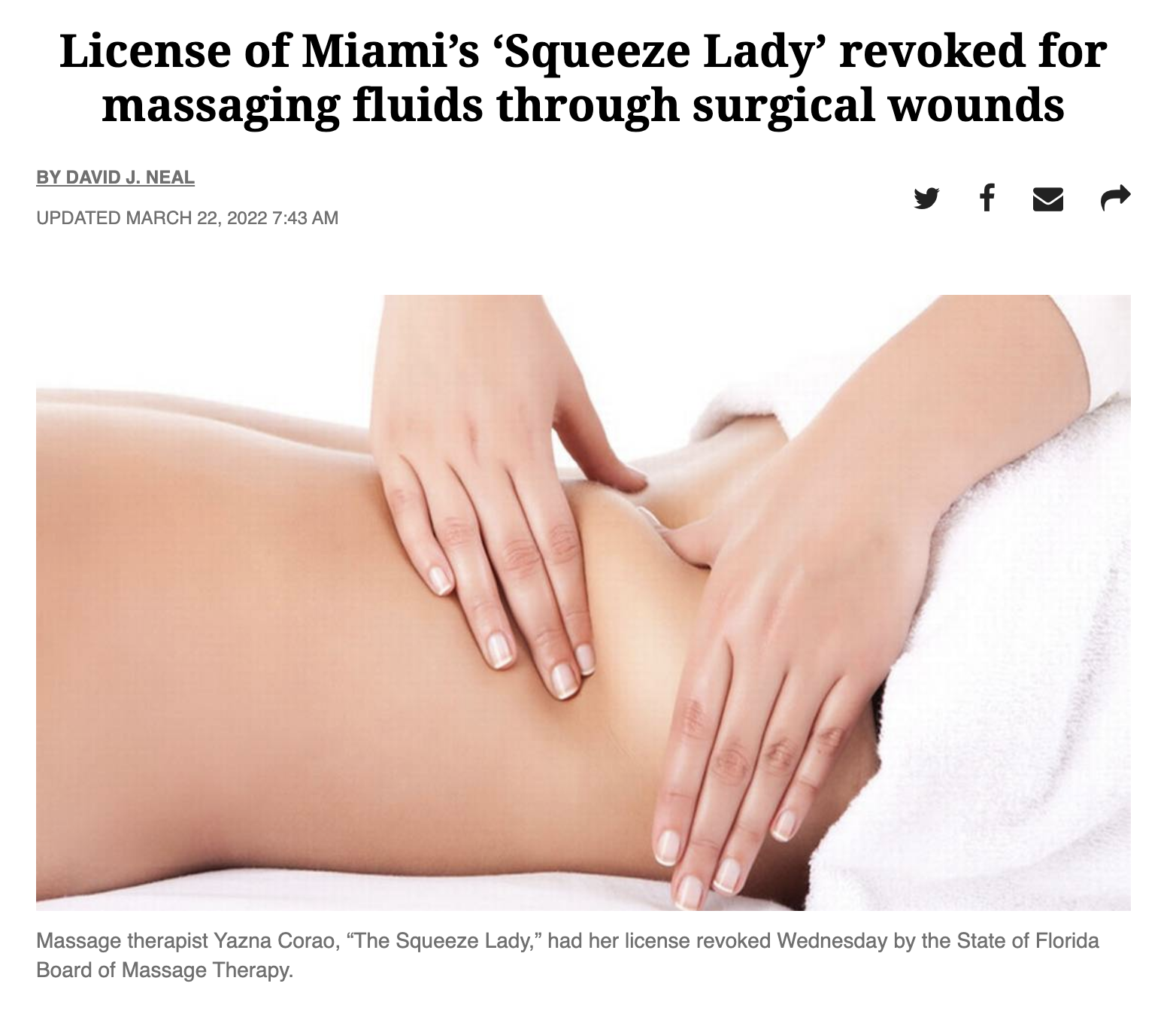
Read full article about the Squeeze Lady losing her license for doing illegal incisional drainage here.
And Another Case of Someone’s License Being Revoked…
In June of 2023 in New Jersey, an aesthetician (Marisol Cabrera) had her license revoked for performing medical procedures because she was doing incisional drainage, which was classified as “the unlicensed practice of medicine”. You can read the documents of that proceeding here.
My reposting of this information is not to shame Ms. Diaz, Ms. Corao, or Ms. Cabrera in particular. The type of incisional drainage they are accused of performing happens every day in Miami and is performed by likely hundreds of people. It is illegal, and it is dangerous. End of story.
Legitimate Therapists Are Trying to Get The Word Out
Below is a post (reposted with permission from the original poster) from a Lymphedema Therapist Facebook group. Slowly, but surely, ladies who have endured this dangerous and unnecessary practice are seeking out legitimate Lymphatic Massage (Manual Lymphatic Drainage).
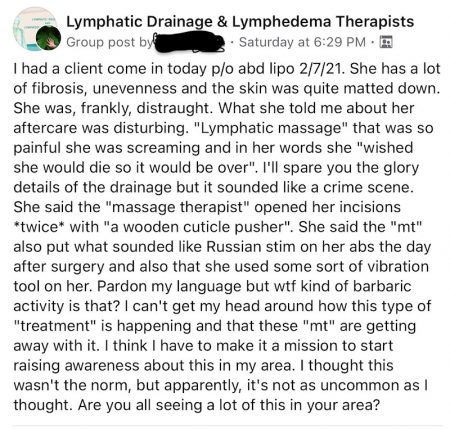
The first time that legitimate therapists hear about these stories, they are horrified – as exemplified in the post above. There is just no need for such brutality if you are seeing someone who is properly trained.
Avoid this type of treatment at all costs. THERE IS A BETTER WAY!
If you are a therapist and are reading this, here is a link to a program that teaches therapists the right way to work with post op clients.
Know How to Assess Your Therapist
Licensure and Education
At first you may not think that licensure is important, but let’s think about this for a second.
For a person to be a licensed massage therapist, they must have a minimal level of schooling – usually no less than 500 hours in most states, and up to 1,000 hours in others.
This education teaches the therapist how to work on the human body safely, because it is possible for them to cause harm – and that is just doing regular simple spa-style, feel-good massage. People whose education has stopped at this level have not learned enough to work on people undergoing plastic surgery recovery.
In almost every state, it is required that a massage license be posted at the place of business.
Just finding a licensed massage therapist
doesn’t mean that person is qualified to work on you after surgery.
You can be a licensed massage therapist, but to work with people after surgery, you need special advanced training.
- Does this person have certification in working with medically fragile people – for example, people who have special medical conditions, have training in how to work with people with cancer (in cases of breast reconstruction after mastectomy, or how to work safely around special implanted medical devices (like drains)?
- Do they ALSO have a certification in Manual Lymphatic Drainage, or even better, are they a fully Certified Lymphedema Therapist?
-
- A CLT (Certified Lymphedema Therapist) has completed 135 hours of extremely intensive training in anatomy and physiology of the lymphatic system, diseases of the lymphatic system, diagnosis of common diseases that cause lymphatic disfunction, compression therapy, fibrosis reduction techniques, and much more.
- Someone who is a CLT-LANA is a CLT who has taken the highest possible exam in the lymphatic profession. It is similar to a doctor who is Board Certified. It is an optional exam, but it means that person really knows their stuff when it comes to the lymphatic system.
- CLT’s are certified through special schools that offer training for Lymphatic Therapy only. You cannot get certified in Manual Lymphatic Drainage or become a Certified Lymphedema Therapist without attending one of these schools. There are only a few of these schools in the United States and Canada. If someone is claiming to be “certified” they should be able to produce a certificate from either Klose Training, Academy of Lymphatic Studies, Norton, or the Vodder School. Massage schools do not certify people in Manual Lymphatic Drainage.
-
Ask your potential therapist:
- How often they work on people with plastic surgery. If there is a long pause, that’s a hint.
- What training they have in plastic surgery recovery
- Are their certifications available online so you can view them?
Is Their Business Legitimate?
A reputable therapist will likely have a city business license as well as a tax registration available on their wall. (I have worked in cities that don’t require a city license, so if you don’t see one, call the city and ask if it is required.)
Insurance is another very important thing you should check for in a therapist. Licensed Massaged Therapists (LMT’s) are required to carry liability insurance in case something happens to a client. When interviewing a potential therapist for post-surgical care, ask what insurance company they have. The two biggest ones in the industry are ABMP and AMTA.
REAL Lymphatic Massage Does Not Hurt
Lymphatic work should not be painful. The videos that you see on YouTube and Instagram of women talk about having to take medications in order to bear the pain of “lymphatic massage” did not get true lymphatic massage.
Real lymphatic massage is so relaxing that most people fall asleep on the table. Yes, even right after surgery.
Just Because Someone Says They Do This Work Doesn’t Mean They are Safe!
Real lymphatic massage uses the body’s lymphatic system (a parallel network of vessels to the veins that carry fluid and waste instead of blood) to remove fluid from a swollen area. That fluid is then returned to the bloodstream, and our kidneys help us pee it out.
What is often called “lymphatic massage” is really something called “incisional drainage.” This is where fluid is forced out of your incisions. It hurts.
While there is nothing wrong with fluid coming out of your incisions on its own in the first couple days after surgery, you should NEVER – I mean NEVER have someone re-open these incisions in order to get out the fluid. This puts you at great risk for developing sepsis – an infection of the blood that can kill you in a matter of hours. At the very least, you’d wind up on IV antibiotics from it and enjoy a night or two in the hospital. No joke.
Is Your Therapist Ethical?
This is a really hard thing to assess because there is no certification to look for to find out if your therapist is an ethical business person. Wouldn’t that be nice?
One of the dirty little secrets about the plastic surgery recovery industry is that people who come looking for therapists don’t fully understand the therapies available, and unethical therapists will sell them anything and everything they can to raise the price tag of those visits.
What you need to look out for are people who push services on you right away that are above and beyond lymphatic massage, good compression, and maybe some lymphatic applications of kinesiotape (I don’t mean tape binding here). By this I mean that you call them up and they start selling you immediately on things like wood therapy, cavitation, etc. before they have even seen you.
Several reputable therapists, myself included, offer lots of bells and whistles – sometimes at an additional charge – and there is nothing wrong with that provided that they are suggested on an as-needed basis – AND that the therapist has the proper training.
A good therapist is going to be one who errs on the side of caution and does not try to over-treat. It is a red flag when someone says that “standard treatment must include” things like cavitation ultrasound, radio frequency, wood sculpting, etc. Usually, this comes in the form of a “recipe for getting super snatched” – and the idea that you must get these therapies or your surgery will all have been for nothing are often propagated on Instagram and YouTube.
A good, ethical therapist will look at you after your surgery and make suggestions for x number of massages based on what is common for that surgery. Then, given your age, whether you have had kids and have lots of loose skin, what kind of shape you were in physically prior to surgery, etc. will determine if they think you might benefit from a little lymphatic taping, or some other minor tweak.
If your therapist is talking about doing cavitation on you right off the bat – especially if you are not yet 5 weeks out of surgery, you should start looking elsewhere for a therapist.
A good therapist will want to see first how you respond to lymphatic massage, your properly fitting Stage 2 faja with foams and boards, and possibly a bit of taping before hopping on the bandwagon for other therapies. While everyone wants to look great immediately, slow and steady wins the race when it comes to healing from plastic surgery.
Each person is different. While there might very well be some people who do need cavitation or radio frequency skin tightening, it isn’t everyone. So, if your therapist is being pushy about such services, they may be thinking about their own pocketbook rather than your needs.
You May Get Incorrect Information
From Your Surgeon for Post-Op Care
This one may seem a little far-fetched, but hear me out. It took me a while to believe this, too.
To be absolutely clear, I’m not bashing surgeons here. Without them, I wouldn’t have a profession. Surgeons are extremely knowledgeable, but not everyone knows everything. Most surgeons want the absolute best for their patients, but there are a handful of surgeons – especially in surgery “Meccas” like Miami – who give out some very scary advice.
If you are skeptical, good! Please keep reading and let me plead my case based on things that have actually happened to me often as a post-op therapist.

I’m NOT Saying to Blatantly Disregard the Advice of Your Surgeon
There are some absolute things that you MUST follow that your surgeon says to do post-op, like don’t sit on your BBL for a minimum of 6-8 weeks, and keep your incisions clean and dry. Don’t work out until you are advised to do so. Rest. Eat well. Avoid alcohol for two full weeks post op. Don’t smoke post-op. These are directions that are tried and true and will help keep you safe in your recovery.
Bad Advice I’ve Heard from Some Surgeons
As much as I hate to say it, some surgeons are not always 100% right with all of their post-op directions.
In my own practice, I have had numerous clients over the years insist that their surgeon told them to go for “deep tissue massage” right after surgery. Initially, I was convinced that either the client had misunderstood the surgeon’s post-op instructions because they were still coming out of anesthesia, or that they were just repeating back to me something that they had seen on Instagram or YouTube.
Then, one day I asked if I could actually see the post-op paperwork from one client who was being insistent that I do deep tissue work on her mere days after her surgery. I thought I would prove her wrong.
Much to my astonishment, this young woman had a prescription that ordered not only deep tissue massage, but ultrasound cavitation to boot! I remember just staring at the paper unable to speak. What that particular surgeon in Miami was recommending was going to cause pain and more inflammation.
No wonder she was having such a hard time believing what I was saying. She thought that if she didn’t get what the surgeon ordered that her surgery results would look terrible.
And, frankly, who could blame her?
Over the years I have lost count of how many of these prescriptions for inappropriate post-op care that I have seen.
These prescriptions for post-op deep tissue massages only serve to perpetuate the myth that you must suffer after your surgery. It doesn’t stop at deep tissue massage. I have heard numerous people tell me that their surgeons told them to use foam rollers, rolling pins, tortilla rollers, and everything else you can imagine to forcibly attack lumps and knots within a week of surgery.
Don’t get me wrong – there are plenty of good surgeons who make good, conservative post-op recommendations. I am thankful beyond measure for these surgeons.
The Worst Post Op Advice I Have Heard from Surgeons
If you have read this far, you will note that I’ve talked about a lot of scary stuff. Remember the incisional drainage (reopening incisions and pushing fluid out of the body)?
This type of post-op advice originally started in the Miami area in the United States. It’s origin is from South America. There is a tiny bit of truth to getting rid of the tumescent fluid that is injected prior to surgery to help constrict blood vessels and make the tissue stiffer. After surgery, it is an irritant. If done at the doctor’s office one time the day after surgery gently by a **Licensed Medical Professional** then that is a different matter. Here I’m speaking of something different.
Some surgeons actually refer their patients to unlicensed, untrained people who reopen incisions and drain the fluid for as many days or weeks as they can make it happen. I wish I could say I was lying about this, but I’m not. Most of my clients go out of state or out of country for their surgeries, and I hear these stories on a daily basis. Sadly, it even happens here in town where I work.
When clients show up in my office and are completely terrified of what I’m going to do to them and have taken numerous pain pills so they can “endure the torture” they expect from me, it just makes my heart sink. Many people are relieved that they don’t have to go through that again. Occasionally, though, I’ll get a client who goes back to their surgeon and when they find out I am not doing illegal medical procedures without a license (draining fluid from incisions), their surgeons tell them to find another therapist. *sigh*
Again, not every surgeon is giving out this dangerous advice. There are enough of them, though, for me to write this article as a word of caution.
Why Aren’t Lymphatics Better Understood by Surgeons?
Surgeons receive years of training to learn their craft. While I know a good deal about what they do because I study plastic surgery on my own and attend surgeries from time to time, I’m not a surgeon. I would never presume to tell a surgeon how to do a surgery.
Likewise, generally speaking, surgeons do not have training in lymphatic work. For that matter, most doctors (I’m not kidding) get maybe a whole hour or less of lecture about the lymphatic system in their entire medical school training. (This isn’t my opinion. Read this peer reviewed published article on that exact topic.) Still don’t believe me? Find someone who knows a doctor and ask them. I have – many of them.
It isn’t the Surgeons’ fault
It is the fact that lymphatics have been ignored in medical school curricula. It’s not that the surgeons don’t care. Just like everyone else in the world, surgeons who lack adequate lymphatic education don’t know what they don’t know. The medical schools are responsible for failing to provide better education to their students. In my humble opinion (well, perhaps not so humble…) medical schools really need to get on the ball and up their game in lymphatic education. Here’s hoping that happens soon.
So, What Do You Do About Finding Legitimate Lymphatic Therapy Post Op?
So, when it comes to lymphatic massage after plastic surgery, it is important that you find someone whose training is specifically in lymphatic therapy. The best option are Certified Lymphedema Therapists if one is available to you. They not only are trained in lymphatic massage (properly called “Manual Lymphatic Drainage [not to be confused with incisional drainage where fluid is pushed out of incisions]), but they also are highly trained in compression which is a critical part of post-operative care.

More Questions About
Plastic Surgery Recovery?
Check out the complete list of blog posts here:
Navigating Your Plastic Surgery Recovery
